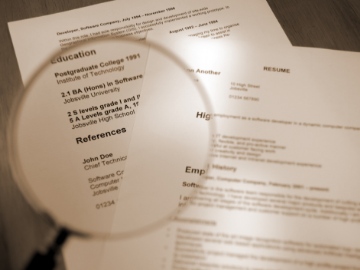The Resume Experience Section: What Is It and Why It Matters

When drafting your resume, one of the most important sections is work experience. Here, you list your professional experience, all your positions, tasks, and tenure with the company.
Work experience plays a big role in your chances of getting a job, so make sure you try and match your resume with the job description. Your resume experience helps employers understand how you can be an important asset to their team.
What is the Resume Experience Section?
The experience section of a resume makes up the bulk of your resume file. It's an itemized list of all your positions, achievements, and qualifications. Because this takes up a big part of your resume, employers mostly focus here when deciding if they should hire you or not based on your skills and career path.
Your work experience section should grab the attention of recruiters. Making it clear and concise and adding visual interest can help make your resume stand out.
Usually, formatting your work experience section starts with your most recent position. From there, you include all other positions you've had over the last decade. Any job positions older than 15 years may be left out since those details aren't important.
Why the Resume Experience Section Matters
A good resume experience section should allow recruiters to see why you would make the perfect candidate for their vacancy. As an applicant, you should be able to convey your qualifications, the skills you've achieved along the way, and how they can benefit you now.
You're competing with other applicants, so your experience section should be short and straight to the point.
-
The experience section reveals your professional background
Writing down your previous jobs can help employers have a summary of your career so far. It matters because they can have an idea of your career trajectory. With this data, they can gauge if someone with your background has a place within their company.
-
The experience section showcases your expertise
Work experience also shows the progress of your expertise in your field. Technical skills needed for the job can give you an edge during recruitment. For example, project head positions require people who can readily provide projects they've previously led.
-
Employers prefer applicants with relevant experience
Relevant experience refers to any position you have that can help you with your next role. Not only is this a good thing to have when applying for work, but the knowledge and skills gained in your previous jobs can be useful to the position you're applying for. Recruiters are always looking for the perfect fit for the job.
-
The experience section also highlights your soft skills
In addition to work experience, you can also use the experience section of a resume to tell hiring managers about your soft skills. You can use qualities like problem-solving and teamwork to help you be an asset to the new company. You can learn technical skills, but soft skills are just as important for employers.
-
The experience section can display your accomplishments
You can also use the work experience section to highlight your career achievements. These give recruiters a hint that you are hardworking and can influence employers to hire you for the position. Applicants with more achievements have higher chances of being given a job offer.
Got the Experience for the Job?
The experience section of a resume, specifically work experience, can tell recruiters a lot about an applicant. It provides a summary of your career background and the skills you've developed along the way to potential recruiters. They can then review your application and make an informed decision. It's why having an effective work experience section is critical for job hunters.
Many jobs are looking for your type of experience; find the right one at Career.com!


